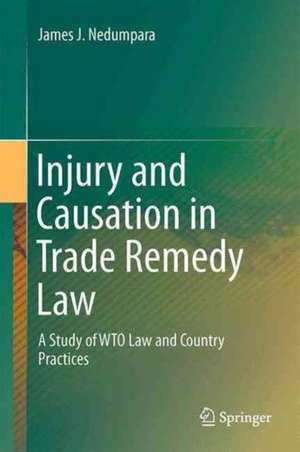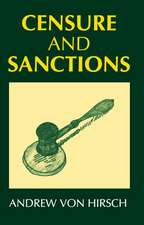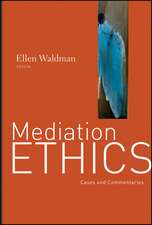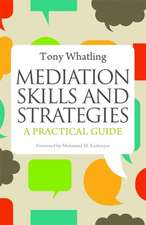Injury and Causation in Trade Remedy Law: A Study of WTO Law and Country Practices
Autor James J. Nedumparaen Limba Engleză Hardback – 4 dec 2016
| Toate formatele și edițiile | Preț | Express |
|---|---|---|
| Paperback (1) | 832.52 lei 38-44 zile | |
| Springer Nature Singapore – 29 apr 2018 | 832.52 lei 38-44 zile | |
| Hardback (1) | 1009.22 lei 22-36 zile | |
| Springer Nature Singapore – 4 dec 2016 | 1009.22 lei 22-36 zile |
Preț: 1009.22 lei
Preț vechi: 1230.76 lei
-18% Nou
Puncte Express: 1514
Preț estimativ în valută:
193.11€ • 202.17$ • 159.79£
193.11€ • 202.17$ • 159.79£
Carte disponibilă
Livrare economică 17-31 martie
Preluare comenzi: 021 569.72.76
Specificații
ISBN-13: 9789811021961
ISBN-10: 9811021961
Pagini: 296
Ilustrații: XLII, 262 p. 8 illus., 7 illus. in color.
Dimensiuni: 155 x 235 x 22 mm
Greutate: 0.71 kg
Ediția:1st ed. 2016
Editura: Springer Nature Singapore
Colecția Springer
Locul publicării:Singapore, Singapore
ISBN-10: 9811021961
Pagini: 296
Ilustrații: XLII, 262 p. 8 illus., 7 illus. in color.
Dimensiuni: 155 x 235 x 22 mm
Greutate: 0.71 kg
Ediția:1st ed. 2016
Editura: Springer Nature Singapore
Colecția Springer
Locul publicării:Singapore, Singapore
Cuprins
Chapter I: Introduction and Research Design.- Chapter II: Historical evolution of injury and causality in trade remedies under GATT/WTO.- Chapter III: Injury and Causality in Trade Remedy Investigations: An Analysis of the WTO Jurisprudence.- Chapter IV: Injury and causality in antidumping investigations: experience of India and other jurisdictions.- Chapter V: Injury and Causality in Safeguards Investigations: Experience of India and other jurisdictions.- Chapter VI: Injury and Causality in Trade Remedies: Developments under the Doha Round.- Chapter VII: General principles of law on causality: Application in the field of trade remedy investigations.- Chapter VIII: findings and conclusions.
Notă biografică
James J. Nedumpara is an Associate Professor of Law and the Executive Director of Centre for International Trade and Economic Laws (CITEL) at Jindal Global Law School. He has several years of years of experience in the field of international trade and has worked with leading law firms, corporate firms and also UNCTAD before joining academia. His specialization is in trade remedy law and international trade regulation. James received his Ph.D in Law from the National Law School of India University, Bangalore and holds Master of Laws degrees from the University of Cambridge, UK, the New York University School of Law, USA as well as the National University of Singapore and a Bachelor degree in Law from the Mahatma Gandhi University, Kerala, India. He was also part of the Indian delegation that appeared before the WTO Appellate Body in India—Import Restrictions on Agricultural Products (Avian Influenza) dispute.
Textul de pe ultima copertă
This book addresses injury and causation issues in the context of antidumping, countervailing duty (CVD) and safeguard investigations that are covered under the WTO. The book traces the origin and the negotiating history of injury and causation in trade remedy instruments and examines how this requirement evolved in the United States and more specifically in the GATT as part of the Kennedy Code, the Tokyo Codes and later the Uruguay Round negotiating texts. The book demonstrates that terms such as “principal cause,” “substantial cause” and “a cause in and of itself” are not necessarily warranted in such instruments. In the light of the experiences of key users of trade remedy instruments and the WTO Doha Round Rules negotiations, the book argues that causation determination does not require mathematical precision. Econometric or quantitative tools may be suggested, but such tools need not undermine the policy-laden nature of trade remedy instruments. Accordingly, the book suggests the use of weak-necessity and strong sufficiency test as a potentially viable causative framework with regard to injury and causation in trade remedies.
Caracteristici
Presents a thorough analysis of injury and causation determination in WTO trade remedy law, antidumping, CVD and safeguard investigations
Provides a comprehensive study of injury and causation in the WTO Doha Round of trade negotiations as well as the practices developed by various WTO members
Makes a compelling case for recasting the injury and causation standards in WTO trade remedy law based on the general theories of causation in law
Includes supplementary material: sn.pub/extras
Provides a comprehensive study of injury and causation in the WTO Doha Round of trade negotiations as well as the practices developed by various WTO members
Makes a compelling case for recasting the injury and causation standards in WTO trade remedy law based on the general theories of causation in law
Includes supplementary material: sn.pub/extras











